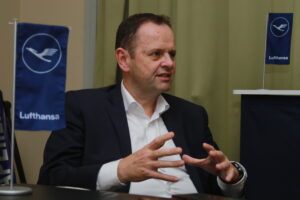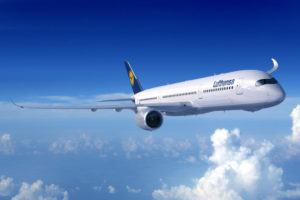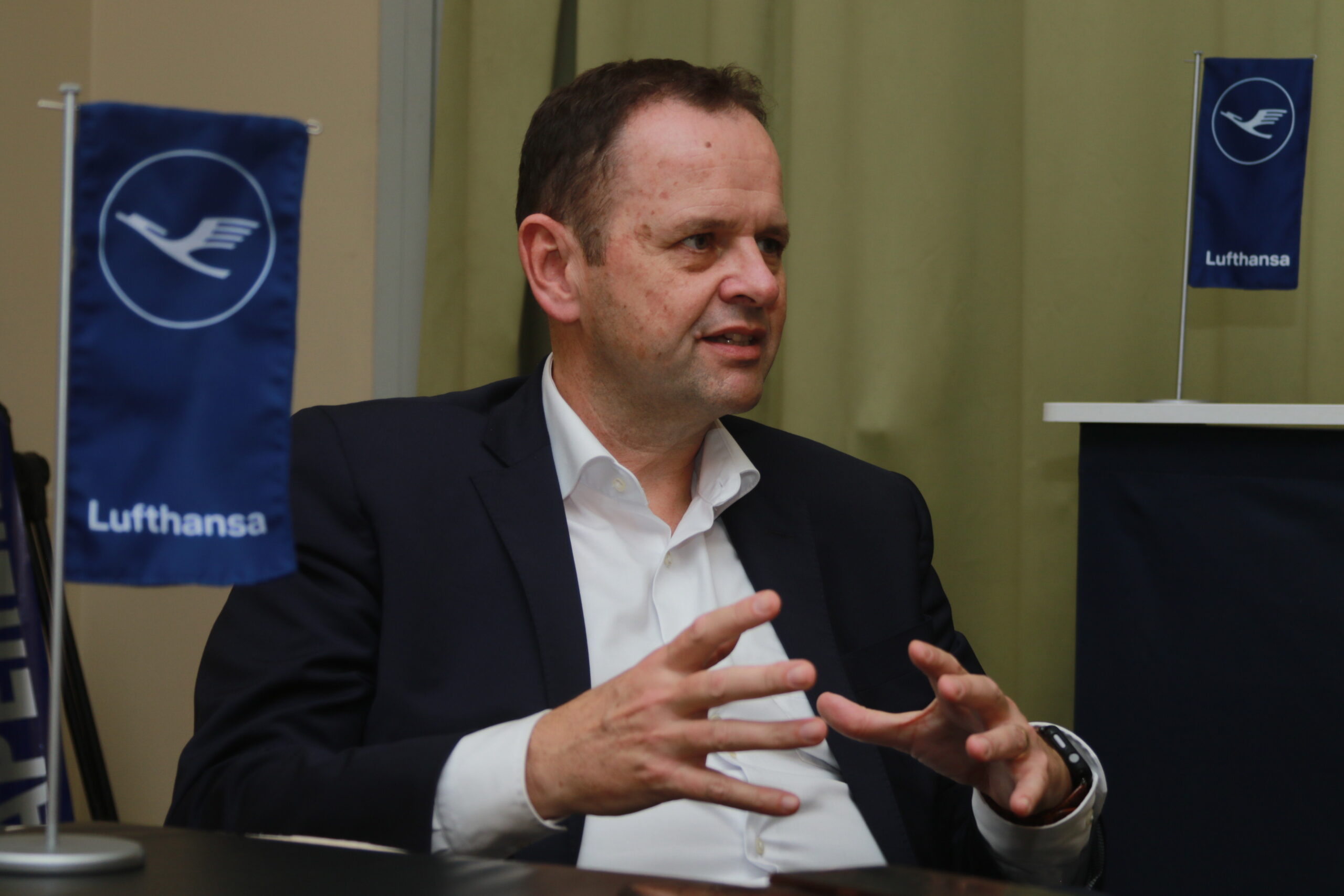
Deutsche Lufthansa AG, commonly known as Lufthansa, one of the few airlines that fly to multiple Nigerian cities, recently celebrated its 60 years of operation in the country. In this interview, Lufthansa Group’s Senior Vice President, Global Markets and Stations, Frank Naeve, spoke on the German flag carrier’s journey so far, its milestones, challenges and dispute over fund repatriation by foreign airlines, among other. Excerpts:
Lufthansa has been operating in Nigeria for the past 60 years. How has the journey been for the airline?
First, we are very proud to have been operating to Nigeria for 60 years. We certainly feel that during that time, we have been able to add value to Nigeria, for its economy and its people. We have always tried to be a good corporate citizen in Nigeria. For us, it is a real positive story that we have been able to be here for six decades.
In all these years, what would you say are the major achievements or milestones of the airline in Nigeria?
If you look at an engagement of six decades, and in a market like Nigeria, I think what we’re most proud of is, first of all, the achievement of the purpose of the Lufthansa Group, which is to connect people, cultures and economies and we certainly feel that we’ve done that. We believe that we have, through our services to Lagos, Abuja and Port Harcourt, been able to develop those points.
Right now, we are one of the few international airlines flying to Port Harcourt. We have made a real contribution to the development of the aviation sector. We have helped Nigerian companies to be more successful in the world with our flights. Furthermore, there is a very large Nigerian Diaspora in the world, and we have been able to connect those families, which we think is very positive.
Finally, there is the cargo side of the business, bringing goods into Nigeria, and also bringing Nigerian products to the world.
The Nigerian business environment has many challenges, especially infrastructure deficits. What would you say are the challenges that you have encountered in these 60 years of operation in the country?
Our experience shows that in order to make progress in the aviation sector, you need to bring all the stakeholders at one table. It is not just the airlines, but also the airport operators, other service providers and government agencies. Over the last 60 years, we believe the Lufthansa Group played an important role in bringing stakeholders together, addressing, and developing the Nigerian aviation sector. At the end of the day, if we see certain areas that we believe can be further developed, we enter into constructive talks with stakeholders and look to make improvements.
Furthermore, we have here in Nigeria a strong local team that is able to engage with the various agencies and government departments to advance the aviation sector as a whole, since over 60 years.
The current economic and financial crisis that followed the outbreak of COVID-19 pandemic, has really affected airlines globally. How did Lufthansa weather the storm?
One key factor about COVID-19 is our flexibility. As an airline, you have to be able to deal with whatever is coming up. Only this year, 2022 was a good example. In the first quarter of the year, there was very little demand, because of the Omicron variant, and then all of a sudden demand shot through the roof. Flexibility and being customer-oriented as we did helped us to stay strong during this past crisis.
Another factor is staying close to the market. We are very happy here in Nigeria to have a very strong sales team, as well as a very experienced operations team. Being able to engage in the markets very closely gives us the information and the intelligence, if you like, to make good decisions. Summarized these are the major factors that helped us.
Is Lufthansa planning to suspend its operations in Nigeria as a result of the challenges faced by foreign airlines to repatriate funds?
I cannot comment the decision of our competitors. Speaking for us as Lufthansa Group, we are committed to the Nigerian market. We want to be able to continue to serve our three destinations and create that value that we talked about a little bit earlier.
We believe that a solution is possible, and we are looking to engage with the various government agencies, to try to find a solution, which is according to global business standards. Various industry groups are also talking to the Nigerian government on the problem of trapped funds as the German government did as well. We believe that a solution is possible through dialogue. Obviously, we monitor closely our financial risk of having the trapped funds here in Nigeria. However, we are looking forward to continuing to serve Nigeria for a long time to come.
How can a big airline Group like Lufthansa help in the growth and development of Nigeria’s aviation sector? And let me just recall that there was a very good intention in the past, that Lufthansa wanted to help. So are you still in line with that?
First, one way to engage is to serve the country and to be very present in the market. We can help the Nigerian aviation sector by our engagement on many levels with different stakeholders. We just had an event where IATA was also represented. By working closely with IATA, and other stakeholders we try to add value.
We believe that we bring expertise to the Nigerian aviation sector. Lufthansa is recognized as one of the leading airline groups. Moreover, our presence in this market supports the overall development of the aviation sector. The way we work at the airports, the processes that we are able to put in place and to implement with our service providers, are state of the art; and with that, we can make a good contribution.
As the VP, Sales for Global Markets, what are the current global passenger trends, especially as it relates to Nigerians, and their favourite destinations?
I believe many of the trends we see in Nigeria also apply globally. Now, there seems to be continued strong demand for air travel. During the pandemic, when people were not able to travel as much as they would like to, I think people are aware about the value of mobility and being able to visit friends or go on a nice holiday. We continue to see this trend both globally and in Nigeria.
Also the leisure segment has remained strong; visiting families and friends, with the large Nigerian Diaspora in many parts of the world, that is still a travel group where the demand is very strong. In addition, what we are seeing as well is a strong return of corporate travel. Obviously, here in Nigeria, the energy sector is a large part of that, as well as the building industry. We feel very confident about that. What we are also seeing, interestingly enough, is a stronger than expected demand for premium travel, be it our Business Class cabin or our seats in Premium Economy Class. That seems to be a fairly sustainable trend out of the pandemic as well. There is a lot happening in the aviation sector. We feel very confident that with our strong local team in Nigeria, that we have the market well covered.
In terms of investment, what new products and offers are you bringing to the Nigerian market?
There are different levels we have to look at. First, what we are planning for a historically high investment in our product that starts on the one hand with the modernization of our fleet. There is a huge investment for new aircraft. Every two weeks a new aircraft comes into the fleet of Lufthansa and that will continue until the year 2028, getting a total of 180 new aircraft into our fleet. That is very important as this has an important impact on our sustainability because these aircraft are very fuel efficient, with reduced Co2 emissions.
Secondly, we also have a massive investment in terms of our onboard products. In the next few years, every seat in our fleet will be renewed, providing more comfort and more amenities. Finally, very important, is everything in and around digital services along the customer journey. So being able to expand that, we all know that customers these days are looking for more and more digital experience. It is comfortable because it allows our passengers to steer some processes themselves.
The adoption of Biometrics is something new in the industry, and a few airlines have reportedly already begun investing in fingerprint and facial recognition technology. Is Lufthansa planning on introducing this in Nigeria, and if so, how soon?
Lufthansa is already working with biometrics in different parts of the world, and we have a specific team working on that. Actually, we have already got the first biometric readers in our hubs, and in certain stations worldwide. The issue of biometrics is very important because we cannot introduce such technology alone. You also need the support of various government agencies that you work with, in order to be able to implement biometrics. For example, in the US, we are working very closely with the TSA in terms of implementing biometric readers and we already have a number of stations where we are already using it. We do not have any concrete plans to implement that in Nigeria for the time being. Again, I think that as that develops, there is no reason why this technology would not be possible in the future in Nigeria or in a number of countries. However, we now focus on certain markets, gaining experience, working by the way very closely with IATA as the industry body and with other government stakeholders as well.

Global warming is a growing concern. What is Lufthansa doing to reduce global warming?
We have a dedicated sustainability action plan, as well as certain elements I mentioned before. We strongly believe a modern fleet produces less Co2 emission. Secondly, we are investing heavily in sustainable aviation fuel. In fact, we are the largest buyer of sustainable aviation fuels in Europe and we will continue down that path. Definitely, we are working with various partners to develop new technologies, which we believe will help us to reduce Co2 emissions. At the end of the day, the Lufthansa Group is committed to reducing Co2 emissions by 50% in 2030, and completely down to zero by 2050. I believe we have a comprehensive package to do that.
For the aviation industry, it is the defining topic that we need to work on. We already have a very strong commitment on the Lufthansa side to work in that direction we already see today. Very specific actions and projects are being implemented within Lufthansa but then also together with partners.






